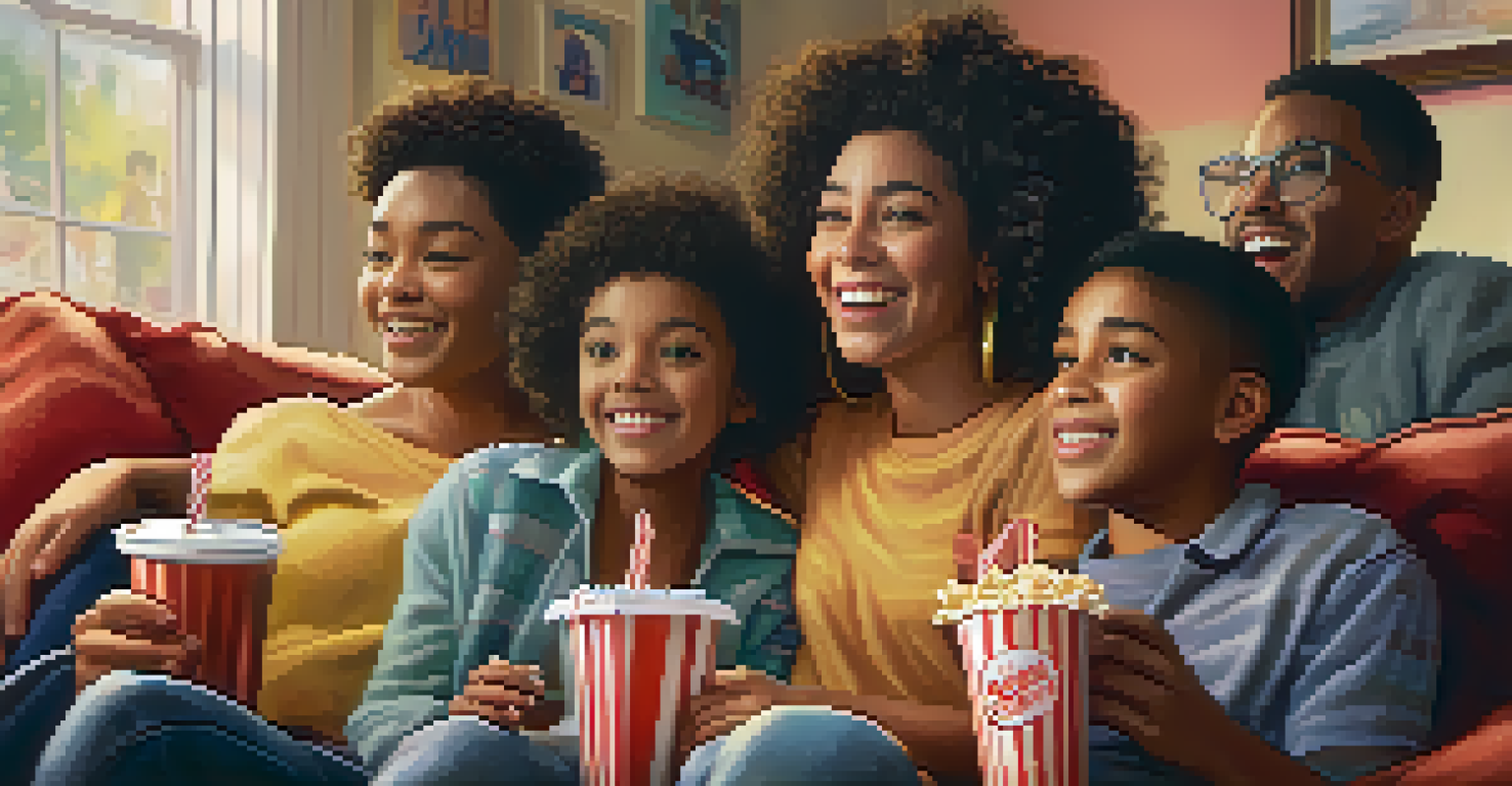Hollywood's Influence on Global Cultural Identity Across Generations

The Origins of Hollywood and Its Global Reach
Hollywood emerged in the early 20th century as a hub for filmmaking, quickly captivating audiences worldwide. Its unique blend of storytelling, star power, and production quality set a new standard for cinema. As films began to travel across borders, they brought with them cultural values and narratives that resonated with diverse populations.
Cinema is a mirror by which we often see ourselves.
The allure of Hollywood was not just in the films themselves but also in the lifestyles and ideals they portrayed. From glamorous red carpets to epic romances, these depictions invited audiences to dream beyond their realities. This exposure often sparked a fascination with American culture, influencing fashion, language, and social norms in various regions.
As Hollywood's influence spread, it also faced the challenge of representing a multitude of cultures. While some films embraced diversity, others perpetuated stereotypes, raising questions about authenticity and representation. Nevertheless, the global reach of Hollywood remains undeniable, shaping cultural dialogues across continents.
Cinematic Tropes and Their Cultural Implications
Cinematic tropes, such as the 'American Dream,' have become ingrained in global culture through Hollywood films. These recurring themes often paint a picture of success, adventure, and freedom that attracts audiences around the world. However, the impact of these tropes goes beyond entertainment; they shape perceptions of what is desirable and achievable in different societies.

For instance, films like 'The Pursuit of Happyness' highlight resilience and the quest for success, resonating with viewers facing their own challenges. Yet, this narrative can sometimes overshadow local stories and achievements, leading to a homogenized view of success that might not reflect the complexities of other cultures. Such dynamics raise important conversations about representation and the need for diverse storytelling.
Hollywood's Global Cultural Influence
Hollywood films shape cultural values and perceptions around the world, often leading to significant changes in fashion, language, and social norms.
Moreover, the romanticization of certain lifestyles portrayed in Hollywood can lead to unrealistic expectations. As audiences aspire to these ideals, they may inadvertently overlook the rich and varied narratives that exist within their own cultures. This phenomenon underscores the importance of balancing global influences with local identity.
The Role of Technology in Cultural Exchange
In recent years, advancements in technology have transformed how Hollywood connects with global audiences. Streaming platforms, social media, and digital marketing allow films to reach viewers in real-time, breaking down geographical barriers. This instant access has not only increased Hollywood's visibility but also facilitated cultural exchange on an unprecedented scale.
The power of film is that it can change our perceptions, provoke thought, and inspire action.
For example, films from different countries are now easily accessible to international audiences, leading to a cross-pollination of ideas and styles. Korean cinema, with hits like 'Parasite,' has gained global acclaim, demonstrating that diverse narratives can thrive alongside traditional Hollywood fare. This shift encourages collaboration and innovation, enriching the cinematic landscape for everyone involved.
However, as Hollywood continues to dominate the digital space, questions arise about the impact on local film industries. While global reach is advantageous, it can also overshadow regional voices and diminish the diversity of storytelling. This creates a delicate balance between embracing global influences and preserving unique cultural identities.
Hollywood's Representation of Gender Roles
Gender representation in Hollywood has evolved significantly, reflecting broader societal changes across generations. Classic films often depicted rigid gender roles, where men were action heroes and women were relegated to supportive roles. However, as cultural attitudes shifted, so too did the narratives surrounding gender, paving the way for more complex characters and storylines.
Contemporary films increasingly showcase strong female protagonists and challenge traditional masculinity, reflecting a growing awareness of gender equality. Movies like 'Wonder Woman' and 'Black Panther' have not only become box office hits but also cultural phenomena, inspiring audiences to rethink gender dynamics. These representations can empower individuals and influence societal views on gender roles.
Diversity and Representation Challenges
While Hollywood has made strides in showcasing diverse narratives, it still grapples with issues of cultural appropriation and the need for authentic representation.
Nevertheless, while progress has been made, there is still work to be done. The ongoing conversation about representation highlights the importance of inclusivity in storytelling. By showcasing diverse experiences, Hollywood can continue to shape and redefine cultural identity across generations.
Cultural Appropriation vs. Appreciation in Filmmaking
The line between cultural appropriation and appreciation in Hollywood has become a hot topic in recent years. As filmmakers draw inspiration from various cultures, questions arise about authenticity and respect for the source material. Instances of cultural appropriation often lead to backlash, sparking discussions about who gets to tell certain stories and how they should be told.
Films like 'Avatar' have faced scrutiny for their portrayal of indigenous cultures, while others, such as 'Coco,' received praise for their respectful representation of Mexican traditions. This highlights the importance of collaboration and consultation with cultural representatives to ensure authentic storytelling. When done thoughtfully, Hollywood can celebrate and honor diverse cultures rather than exploit them.
As audiences become more aware of these issues, they wield significant influence over Hollywood's practices. Social media platforms amplify voices that demand change, pushing for more inclusive and representative narratives. This evolving landscape encourages filmmakers to prioritize cultural sensitivity and foster genuine appreciation in their work.
Hollywood's Impact on Youth and Identity Formation
For many young people, Hollywood films play a pivotal role in shaping their identities and worldviews. As they consume stories that reflect their experiences or challenge societal norms, they learn about themselves and their place in the world. This process of identity formation is crucial during adolescence, as individuals begin to explore their values, beliefs, and aspirations.
Movies often provide a mirror for youth, allowing them to see their struggles and triumphs represented on screen. Films like 'Mean Girls' and 'The Breakfast Club' resonate with young audiences, addressing themes of friendship, acceptance, and self-discovery. These narratives not only entertain but also offer valuable life lessons that can guide young viewers in their own journeys.
Youth Identity Through Film
For young audiences, Hollywood films play a crucial role in identity formation, reflecting their experiences while also presenting both positive and unrealistic societal standards.
However, the influence of Hollywood is not without its challenges. Unrealistic portrayals of beauty, success, and relationships can create pressure to conform to unattainable standards. As discussions around mental health and self-image gain traction, it is essential for filmmakers to recognize their role in shaping cultural narratives that positively impact youth.
The Future of Hollywood and Global Cultural Identity
As we look to the future, Hollywood's influence on global cultural identity remains a dynamic and evolving landscape. With the rise of international filmmakers and the increasing demand for diverse narratives, the industry is beginning to embrace a more inclusive approach. This shift not only enriches storytelling but also reflects the changing demographics of global audiences.
Collaborative projects between Hollywood and international filmmakers are becoming more common, allowing for a fusion of ideas and styles. This blending of cultures can create innovative films that resonate with viewers from various backgrounds. As a result, audiences are more likely to see themselves represented on screen, fostering a sense of belonging and connection.

Ultimately, the future of Hollywood lies in its ability to adapt and respond to the needs of a global audience. By prioritizing authenticity, inclusivity, and cultural sensitivity, Hollywood can continue to shape and reflect cultural identities for generations to come. The journey is ongoing, and the potential for positive change is immense.